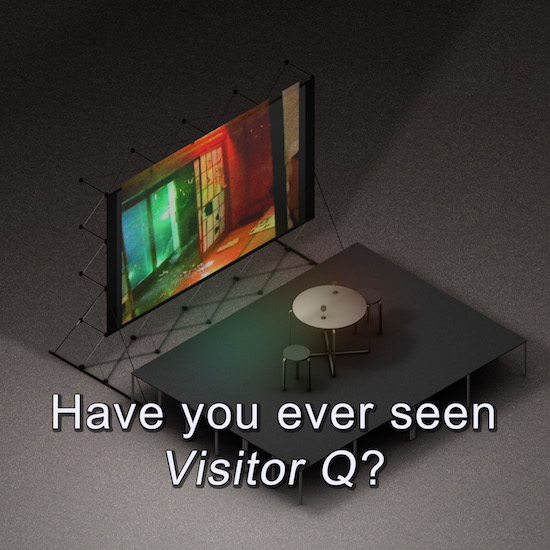Contains spoilers
In the opening scene of Takashi Miike’s 2001 film Visitor Q we find Miki Yamazaki, a young prostitute, trying to persuade her father into having sex with her. Her father is filming the conversation for a documentary he is making on Japanese youth culture, and eventually agrees to her proposed fee of 50,000 yen. Afterwards Yamazaki informs her father that, due to the disappointingly short nature of the experience, it will actually cost him 100,000 yen, which he reluctantly pays. This proves to be the relatively vanilla introduction to an 84-minute story that goes on to portray eye-watering acts of murder, mutilation, heroin abuse and necrophilia.
Admittedly, it’s not classic first date material. But then the date scene depicted in Hans Appelqvist’s new stage show Have You Ever Seen Visitor Q? is far from typical itself: at the start of the piece we learn that the male character, Peter, has recently decided to spend his life with his hands covering his eyes, for reasons he is initially reluctant to divulge – including during dinner with his literal blind date, Leah, who talks so effusively about the Japanese cult classic across the evening. Of course, that’s all before she whispers "I’ll penetrate you" in Peter’s ear, causing him to fall off his chair. Are you up to speed? Good.
If you’re still reeling, perhaps you’ve never encountered Appleqvist’s work before. Born in Höör, Sweden, the artist has been releasing ambient and experimental music since 2002’s Tonefilm, though from the outset of his career music has only been one part of a wider, intertextual palette that his work draws from. Last year a film he soundtracked, The Raft, was nominated and won in its category at CPH:DOX, a well-respected documentary film festival in Copenhagen; on the day I speak to Appelqvist, he’s about to find out if the latest film he’s scored, A Stranger will make it two years in a row.
Nonetheless, it seems Appelqvist still sees himself as something of an outsider. "I’m always looking at theatre and thinking about how to improve it," he says, "because I’m not happy with theatre as it’s usually produced; it’s so text-oriented, in Sweden at least. That’s the tradition here, that it’s all about the acting and the text." For someone who moves through music, script, dialogue and performance as interlocking elements, he views it as a wasted opportunity. "I’m more interested in what music and what the room can do, to play around with moods instead of just focusing on the text."
Written, directed and scored by Appelqvist himself, Have You Ever Seen Visitor Q? is the auteur’s latest excursion beyond those traditional borders. The accompanying score itself is dominated by ‘Furtive’, a half-hour ambient piece with his trademark inclusion of spoken word parts occasionally punctuating the piece, though there are more dramatic set pieces included. ‘Frysh’ develops into a pulsating, anxiety-driven crescendo of bass synths and piano, while ‘Intermezzo’ is all sprightly chimes and percussion. The intention is that each piece will provide varying levels of background scenery and dramatic interruptions, phrasing the appropriate emphasis during the plot’s frequent mood swings.
The story follows Peter and Leah as their date becomes increasingly intense and emotionally charged, including the aforementioned digression into Miike’s Visitor Q itself. "It’s so interesting and transgressive and horrible," he says of the 2001 film. "With films like Saw and Hostel, they’re just all about being gross, about coming up with the sickest ideas and then putting them into film. But this is something else. It’s really weird. So I wanted to get it into my art in some way. Then there’s also this idea that art can influence you physically – it can make your body react physically, which is amazing."
As part of his research for the piece, Appelqvist found himself drawn to the work of American film scholar Linda Williams. In her 1991 article ‘Film Bodies: Gender, Genre, And Excess’, Williams outlined her theory that certain strands of film perceived as being taboo or low brow were, in fact, often challenging and subverting gender norms. She referred to these films as ‘body genres’, texts that produced visceral, physical reactions from the audience through three primary templates: melodrama, pornography, and horror. While each of these typically relied on the sound of women’s reaction to male aggression – crying out in despair, terror, or a sonic barrage of faked orgasms – the opportunity was also ripe for tables to be turned.
"Like all popular genres, they address persistent problems in our culture, in our sexualities, in our very identities," Williams explained. "The deployment of sexualities, violence, and emotion is thus in no way gratuitous and in no way strictly limited to each of these genres; it is instead a cultural form of problem solving."

In Have You Ever Seen Visitor Q? the characters touch on this concept, without explicitly detailing the theory, in relation to each other. Presumably Appelqvist is hoping to elicit the same responses in his own audience? (One stage direction reads: ‘During the story Leah makes Peter and the audience cry’.) "Exactly. You’ll experience the emotions: you’ll cry, you’ll feel scared, you’ll get horny. That’s the ambition. But it’s hard, especially to make people cry. That’s the hardest."
Reading Williams’ work, he says, helped to unlock that understanding on a critical level. "Her idea was that once you put those things on the set, you’re always mirroring yourself in the characters on screen. So I’m going to try and do that too. The characters will experience these emotions with the audience."
Why are film makers, musicians, and artists in general so devoted to producing those reactions? And why, as consumers, are we always so thrilled when they succeed? Perhaps the most common evaluation is that it’s a form of release, allowing the mind and body to purge itself of fear and desire as the emotions pass through them. Appelqvist seems to agree: "I watch a lot of horror films, and for me, I think it’s about exploring our more destructive feelings. It’s a similar thing with porn. You’re doing it because you want to get frustrated, and then get it out of your system."
Is it that simple though?
The other popular theory, of course, is that body genres such as Visitor Q provide an opportunity to explore ideas and concepts that are otherwise considered immoral or forbidden in polite society, therefore allowing the consumer to feel safely disgusted without being upset that anyone really got hurt – or, perhaps, safely excited without being upset that anyone really got hurt. In Appelqvist’s piece, Leah becomes frustrated at Peter’s moral panic upon hearing her relay some of the scenes in Miike’s film. "The film didn’t invent necrophilia," she says in one exchange. "You’re missing the point. The film just uses these ideas to fuck with your brain… I just wish I could make you understand somehow. And that’s hard because you choose to be all moralistic about it."
But emotion is rarely performative in this way. When we cry at a sad film or song, our brains have little concept of how far removed we are from the action; something has slipped through the net, and for a moment we experience a pain that is entirely real. When we do not ‘choose to be all moralistic about it’, we potentially miss out on the experience altogether. Leah seems to acknowledge this – and Appelqvist admits he’s "more on her side" – in one of the piece’s key scenes: "The main reason those scenes triggered those bodily reactions is because I mirrored them. I used my sight. It’s when you see someone on screen crying… Your body mirrors what you see."
If we enjoy mirroring the sex, sadness or fear of the bodies we see on the screen – if we imagine ourselves in their bodies, experiencing their orgasms and heartbreak – what emotional value do we acquire from some of the more openly distressing scenes that these kind of films portray? Is it sheer curiosity at the vicarious participation in something transgressive? "Yeah, definitely," Appelqvist says. "That’s a strong idea in the piece: that the role of art should be to provide an experimental playground where you can basically do anything, since it’s not hurting anyone. Like Visitor Q: it puts all these wrong, immoral, terrible things into this film universe, and we get a chance to explore our feelings towards them."
At the end of Have You Ever Seen Visitor Q? little has been resolved, though Peter’s mentality appears to have shifted. The key distinction, Appelqvist suggests, is that transgressive art can be a positive, exhilarating experience when it’s done right. It doesn’t have to be an ordeal. "There are no traumas in my life that I need to work through. I don’t need therapeutic help from art in that way. So for me it’s about entertainment: let’s just put these ideas together and see what happens." Most of all, art should remain a vehicle for pushing ideas in a way that keeps opening audience’s minds, to relocate our gaze toward the gaps of light that emerge between our fingers, still anxiously shielding our eyes from the world’s horrors. "It should be playful, that’s the whole thing. You should have fun with your body and mind, talk to people, have sex with people. Enjoy it."



